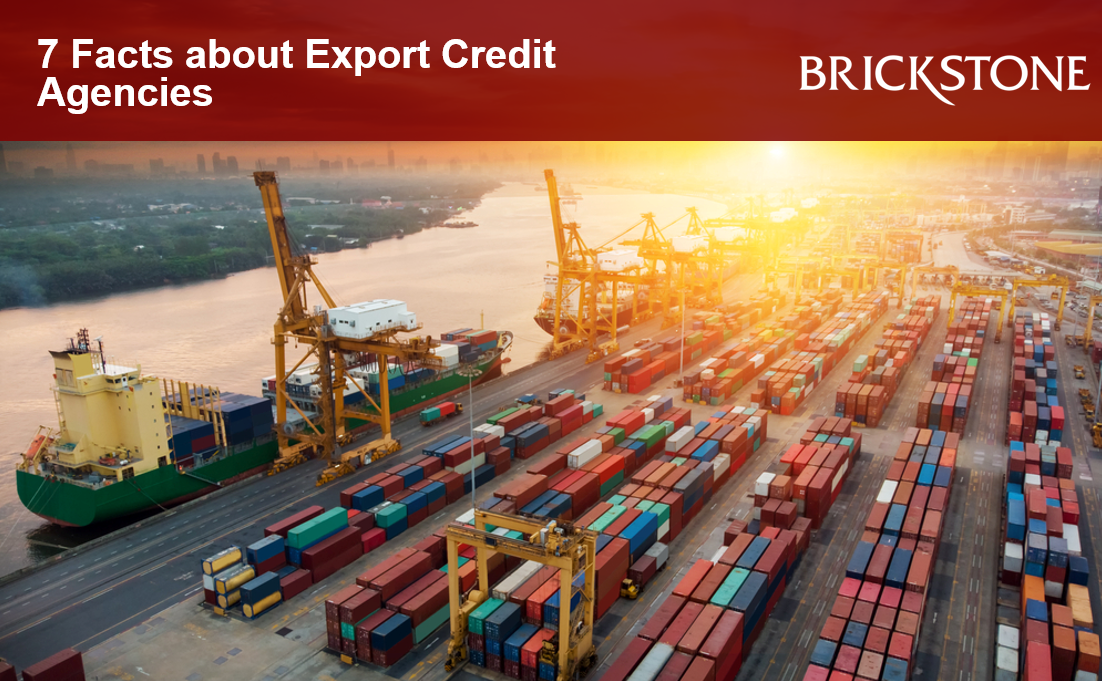7 Facts about Export Credit Agencies
Export credit agencies were previously a lender of last resort, stepping in only when private-sector financing was unavailable. However, they’ve taken on a greater role since the 2008 Global Financial Crisis as banks became more risk-averse, leaving many companies looking for a new alternative to support their exports in riskier or more volatile markets. According to the Corporate Finance Institute, their respective services were offered to minimize the risk of participating in international markets and decrease the barriers to entry for domestic businesses.
Now there are scores of national export credit agencies worldwide, collectively providing hundreds of billions of dollars a year toward companies’ efforts to sell goods and services abroad.
This article by Brickstone reviews some institutional reports and publications on Export Credit Agencies, highlighting key facts and insights.
Export Credit Agencies
According to the CFI, export credit agency (ECA) is an institution that works to support companies with their international trade. Export credit agencies can be private, quasi-governmental, or entirely run by the government. They offer financing solutions and risk insurance (guarantees) for companies trying to export and import products.
The purpose of ECAs is to support the domestic economy and employment by helping companies find overseas markets for their products.
An ECA’s services can be received as credit, credit insurance, or a combination of both. Their services are often very similar to regular banking or insurance companies – the difference being that they accept taking on the risk of international trade.
The following are key facts about Export Credit Agencies:
Export credit agencies are government backed institutions that finance domestic companies’ exports and investments abroad in the form of loans, guarantees and insurances to help eliminate or limit the risks of non-payment or selling goods and services in overseas markets. They can be government institutions or private companies operating on behalf of governments.
Ultimately, ECAs are in place to support domestic businesses of all sizes. Such support can take the form either of “official financing support”, such as direct credits to foreign buyers, refinancing or interest-rate support, or of “pure cover support”, such as export credits insurance or guarantee cover for credits provided by private financial institutions.
ECAs serve intermediary roles between domestic firms that are exporters and the federal government. Though ECAs are run as private agencies, these credit agencies facilitate international trade and foster export operations. There is no fixed model for an export credit agency, hence why some ECAs are partly controlled by government departments, and some are privately-owned brokerages.
According to Investopedia, export credit agencies are increasingly critical to national industrial strategies. They can arrange government-backed loans, guarantees and insurance in some of the world’s riskiest and most volatile markets. In many cases, development projects such as major infrastructure might never get built without their support.
Similarly to banks, export credits or insurance can be supplied for short-term (up to 2 years), medium-term (2 to 5 years), and long-term (over 5 years). An export credit agency will be chosen over a bank or insurance company due to their specialization in their practice and in foreign markets. Many banks and insurance companies do not want to take on the additional risk that comes with international trade. It is why many ECAs have taken on a more significant role.
Governments often create or support export trade agencies because of their beneficial effects on the economy. Creating an export plan can boost business sales and overall growth for small and large companies. It can also connect them with potentially untapped niche markets without the need to move operations abroad.
According to Trade Finance Global, authoritatively supported export credit is connected to official development assistance (ODA) which makes the agency subject to the regulations set by the Organisation for Economic Co-operation and Development (OECD). This has provided a framework for export credit agencies to legally abide by where the arrangement sets forth the most (generous) export credit terms and conditions that can be officially supported. This ensures that competition is based on the price and quality of the exported goods and not the financial terms provided
Read more on Export Credit Agencies here.





